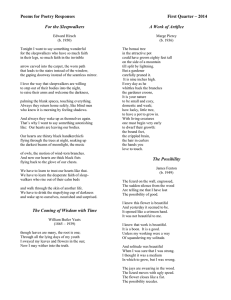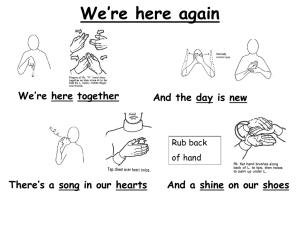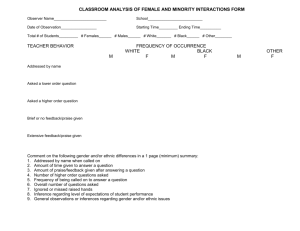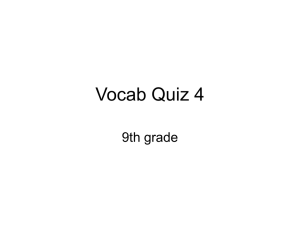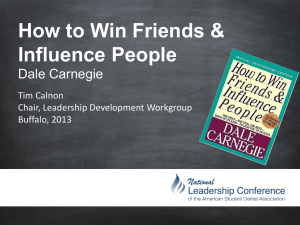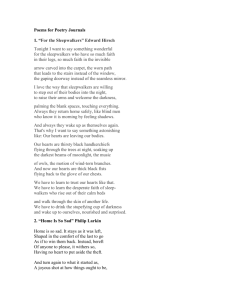Quarter 3 Poetry List
advertisement
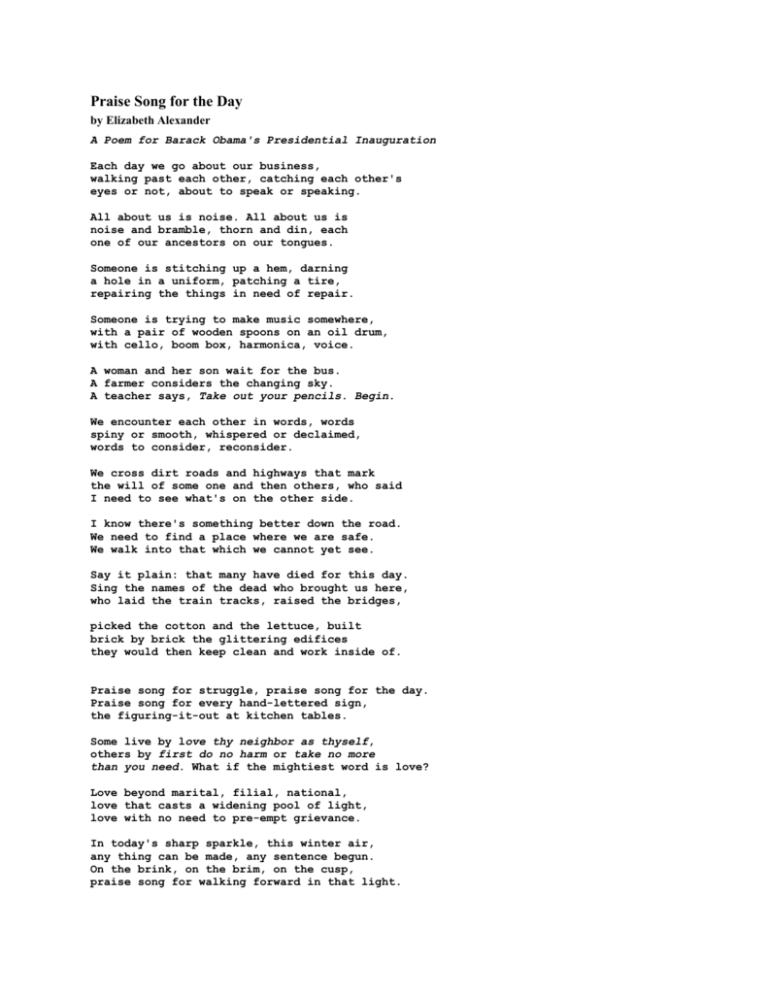
Praise Song for the Day by Elizabeth Alexander A Poem for Barack Obama's Presidential Inauguration Each day we go about our business, walking past each other, catching each other's eyes or not, about to speak or speaking. All about us is noise. All about us is noise and bramble, thorn and din, each one of our ancestors on our tongues. Someone is stitching up a hem, darning a hole in a uniform, patching a tire, repairing the things in need of repair. Someone is trying to make music somewhere, with a pair of wooden spoons on an oil drum, with cello, boom box, harmonica, voice. A woman and her son wait for the bus. A farmer considers the changing sky. A teacher says, Take out your pencils. Begin. We encounter each other in words, words spiny or smooth, whispered or declaimed, words to consider, reconsider. We cross dirt roads and highways that mark the will of some one and then others, who said I need to see what's on the other side. I know there's something better down the road. We need to find a place where we are safe. We walk into that which we cannot yet see. Say it plain: that many have died for this day. Sing the names of the dead who brought us here, who laid the train tracks, raised the bridges, picked the cotton and the lettuce, built brick by brick the glittering edifices they would then keep clean and work inside of. Praise song for struggle, praise song for the day. Praise song for every hand-lettered sign, the figuring-it-out at kitchen tables. Some live by love thy neighbor as thyself, others by first do no harm or take no more than you need. What if the mightiest word is love? Love beyond marital, filial, national, love that casts a widening pool of light, love with no need to pre-empt grievance. In today's sharp sparkle, this winter air, any thing can be made, any sentence begun. On the brink, on the brim, on the cusp, praise song for walking forward in that light. For the Sleepwalkers Edward Hirsch (b. 1950) Tonight I want to say something wonderful for the sleepwalkers who have so much faith in their legs, so much faith in the invisible arrow carved into the carpet, the worn path that leads to the stairs instead of the window, the gaping doorway instead of the seamless mirror. I love the way that sleepwalkers are willing to step out of their bodies into the night, to raise their arms and welcome the darkness, palming the blank spaces, touching everything. Always they return home safely, like blind men who know it is morning by feeling shadows. And always they wake up as themselves again. That’s why I want to say something astonishing like: Our hearts are leaving our bodies. Our hearts are thirsty black handkerchiefs flying through the trees at night, soaking up the darkest beams of moonlight, the music of owls, the motion of wind-torn branches. And now our hearts are thick black fists flying back to the glove of our chests. We have to learn to trust our hearts like that. We have to learn the desperate faith of sleepwalkers who rise out of their calm beds and walk through the skin of another life. We have to drink the stupefying cup of darkness and wake up to ourselves, nourished and surprised. The Coming of Wisdom with Time William Butler Yeats though leaves are many, the root is one; Through all the lying days of my youth I swayed my leaves and flowers in the sun; Now I may wither into the truth. (1865 – 1939) A Work of Artifice Marge Piercy The bonsai tree in the attractive pot could have grown eighty feet tall on the side of a mountain till split by lightning. But a gardener carefully pruned it. It is nine inches high. Every day as he whittles back the branches the gardener croons, It is your nature to be small and cozy, domestic and weak; how lucky, little tree, to have a pot to grow in. With living creatures one must begin very early to dwarf their growth: the bound feet, the crippled brain, the hair in curlers the hands you love to touch. (b. 1936) The Possibility James Fenton The lizard on the wall, engrossed, The sudden silence from the wood Are telling me that I have lost The possibility of good. I know this flower is beautiful And yesterday it seemed to be. It opened like a crimson hand. It was not beautiful to me. I know that work is beautiful. It is a boon. It is a good. Unless my working were a way Of squandering my solitude. And solitude was beautiful When I was sure that I was strong. I thought it was a medium In which to grow, but I was wrong. The jays are swearing in the wood. The lizard moves with ugly speed. The flower closes like a fist. The possibility recedes. (b. 1949) Unveiling Linda Pastan (b. 1932) In the cemetery a mile away from where we used to live my aunts and mother, my father and uncles lie in two long rows almost the way they used to sit around the long planked table at family dinners. And walking beside the graves today, down one straight path and up the next, I don’t feel sad for them, just left out a bit as if they kept from me the kind of grown-up secret they used to share back then, something I’m not quite ready yet to learn. Even If You Weren’t My Father Camillo Sbarbaro (1888-1967) Father, even if you weren’t my father, were you an utter stranger, for your own self I’d love you. Remembering how you saw, one winter morning, the first violet on the wall across the way, and with what joy you shared the revelation; then, hoisting the ladder to your shoulder, out you went and propped it to the wall. We, your children, stood watching at the window. And I remember how, another time, you chased my little sister through the house (pigheadedly, she’d done I know not what). But when she, run to earth, shrieked out in fear, your heart misgave you, for you saw yourself hunt down your helpless child. Relenting then, you took her in your arms in all her terror: caressing her, enclosed in your embrace as in some shelter from the brute who’d been, one moment since, yourself. Father, even were you not my father, were you some utter stranger, for your innocence, your artless tender heart, I would love above all other men so love you. Toads Philip Larkin (1922-1985) Why should I let the toad work Squat on my life? Can’t I use my wit as a pitchfork And drive the brute off? Six days of the week it soils With its sickening poison— Just for paying a few bills! That’s out of proportion. Lots of folk live on their wits: Lecturers, lispers, Losels, loblolly-men, louts— They don’t end as paupers; Lots of folk live up lanes With fires in a bucket, Eat windfalls and thinned sardines— Them seem to like it. Their nippers have got bare feet, Their unspeakable wives Are skinny as whippets – and yet No one actually starves. Ah, were I courageous enough To shout Stuff your pension! But I know, all too well, that’s the stuff That dreams are made on: For something sufficiently toad-like Squats in me, too; Its hunkers are heavy as hard luck, And cold as snow, And will never allow me to blarney My way to getting The fame and the girl and the money All at one sitting. I don’t say, one bodies the other, One’s spiritual truth; But I do say it’s hard to lose either, When you have both. Defining the Grateful Gesture Yvonne Sapia (b. 1946) According to our mother, when she was a child what was placed before her for dinner was not a feast, but she would eat it to gain back the strength taken from her by long hot days of working in her mother’s house and helping her father make candy in the family kitchen. No idle passenger traveling through life was she. And that’s why she resolved to tell stories about the appreciation for satisfied hunger. When we would sit down for our evening meal of arroz con pollo or frijoles negros con platanos she would expect us to be reverent to the sources of our undeserved nourishment, and to strike a thankful pose before each lift of the fork or swirl of the spoon. For the dishes she prepared we were ungrateful, she would say, and repeat her archetypal tale about the Perez brothers from her girlhood town of Ponce, who looked like ripe mangoes, their cheeks rosed despite poverty. My mother would then tell us about the day she saw Mrs. Perez searching the neighborhood garbage, picking out with a missionary’s care the edible potato peels, the plantain skins the shafts of old celery to take home to her muchachos who required more food than she could afford. Although my brothers and I never quite mastered the ritual of obedience our mother craved, and as supplicants failed to feed her with our worthiness, we’d sit like solemn loaves of bread, sighing over the white plates with a sense of realization, or relief, guilty about possessing appetite. The Writer Richard Wilbur (b. 1921) In her room at the prow of the house Where light breaks, and the windows are tossed with linden My daughter is writing a story. I pause in the stairwell, hearing From her shut door a commotion of typewriter-keys Like a chain hauled over a gunwale. Young as she is, the stuff Of her life is a great cargo, and some of it heavy: I wish her a lucky passage. But now it is she who pauses, As if to reject my thought and its easy figure. A stillness greatens, in which The whole house seems to be thinking And then she is at it again with a bunched clamor Of strokes, and again is silent. I remember the dazed starling Which was trapped in that very room, two years ago How we stole in, lifted a sash And retreated, not to affright it; And how for a helpless hour, through the crack of the door, We watched the sleek, wild, dark And iridescent creature Batter against the brilliance, drop like a glove To the hard floor, or the desk-top, And wait then, humped and bloody, For the wits to try it again; and how our spirits Rose when, suddenly sure, It lifted off from a chair-back, Beating a smooth course for the right window And clearing the sill of the world. It is always a matter, my darling, Of life or death, as I had forgotten. I wish What I wished you before, but harder. Disillusionment at Ten O’Clock Wallace Stevens (1879 – 1955) The houses are haunted By white night-gowns. None are green. Or purple with green rings, Or green with yellow rings, Or yellow with blue rings, None of them are strange With socks of lace And beaded ceintures. People are not going To dream of baboons and periwinkles. Only, here and there, an old sailor, Drunk and asleep in his boots, Catches tigers In red weather. Acquainted with the Night Robert Frost 1874-1963) I have been one acquainted with the night. I have walked out in rain – and back in rain. I have outwalked the furthest city light. I have looked down the saddest city lane. I have passed by the watchman on his beat And dropped my eyes, unwilling to explain. I have stood still and stopped the sound of feet When far away an interrupted cry Came over houses from another street, But not to call me back or say good-by; And further still at an unearthly height One luminary clock against the sky Proclaimed the time was neither wrong nor right. I have been one acquainted with the night. The Gift Li-Young Lee (b. 1957) To pull the metal splinter from my palm my father recited a story in a low voice. I watched his lovely face and not the blade. Before the story ended he removed the iron sliver I thought I’d die from. I can’t remember the tale but hear his voice still, a well of dark water, a prayer. And I recall his hands two measures of tenderness he laid against my face, the flames of discipline he raised above my head. Had you entered that afternoon you would have thought you saw a man planting something in a boy’s palm, a silver tear, a tiny flame. Had you followed that boy you would have arrived here, where I bend over my wife’s right hand. Look how I shave her thumbnail down so carefully she feels no pain. Watch as I lift the splinter out. I was seven when my father took my hand like this, and I did not hold that shard between my fingers and think, Metal that will bury me, christen it Little Assassin, Ore Going Deep for My Heart. And I did not lift up my wound and cry, Death visited here! I did what a child does when he’s given something to keep. I kissed my father. "Tudzin, Alecia / AP Poems October 2011." Tudzin, Alecia / AP Poems October 2011. N.p., n.d. Web. 30 May 2013.
